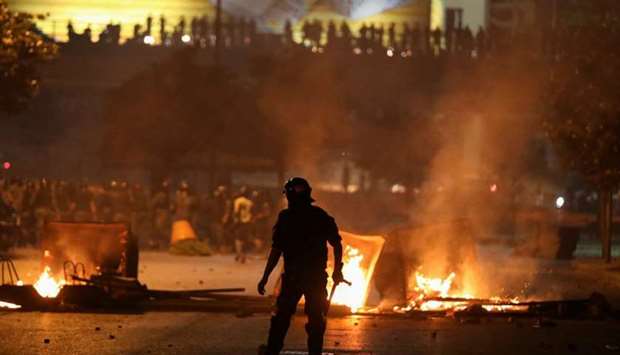Night-time protests returned to the streets of the capital Beirut Friday despite promises by the Lebanese government to improve the country's deepening financial crisis.
Dozens of masked young men rode motorcycles in central Beirut, while others took to the streets to smash shop windows.
Some protesters set fire to garbage bins and threw stones at anti-riot police, who in turn fired tear gas.
In the northern port city of Tripoli, similar demonstrations were taking place, with protesters blocking roads and setting fire to shops and banks.
The demonstrations were sparked by new price hikes after a sharp devaluation of the Lebanese pound on the black market.
Ealier Friday, Prime Minister Hassan Diab headed a emergency meeting, attended by central bank Governor Riad Salameh, amid fears grow that Lebanon was spiralling toward economic collapse.
A government source close to the talks said the meeting ended after discussing ways to stabilise the Lebanese pound and stop its plunge against the dollar.
The government ministers will continue their talks to examine the security situation and financial issues in the country, the source added without elaborating.
The head of the Money Exchange Syndicate, Mahmoud Mrad, told reporters that the central bank governor had promised to inject dollars into the Lebanese market to prop up the national currency.
Mrad added that members of the syndicate were committed to selling the dollar at the official rate of 3,940 pounds.
The pound was trading as high as 5,500 against the dollar in the black markets in some areas of Lebanon.
The local currency has lost around 70% of its value since mass protests erupted in the country in mid-October.
The economic crisis was also at the centre of a meeting Friday between Lebanese President Michel Aoun and parliament Speaker Nabih Berri.
Emerging from the meeting, Berri said efforts were being made to "stabilise the Lebanese pound and protect people's interests." He did not give details.
Asked about the possible resignation of Lebanon's central bank governor, Berri replied: "We need everybody at this point."
Lebanon is experiencing its worst economic crisis since the 1975-1990 civil war, prompting banks to impose restrictions on Lebanese pound and dollar withdrawals.
In March, Lebanon announced that it would suspend payments of maturing Eurobonds in order to safeguard the foreign currency reserves needed to meet basic imports.
Some protesters set fire to garbage bins and threw stones at anti-riot police, who in turn fired tear gas.
In the northern port city of Tripoli, similar demonstrations were taking place, with protesters blocking roads and setting fire to shops and banks.
The demonstrations were sparked by new price hikes after a sharp devaluation of the Lebanese pound on the black market.
Ealier Friday, Prime Minister Hassan Diab headed a emergency meeting, attended by central bank Governor Riad Salameh, amid fears grow that Lebanon was spiralling toward economic collapse.
A government source close to the talks said the meeting ended after discussing ways to stabilise the Lebanese pound and stop its plunge against the dollar.
The government ministers will continue their talks to examine the security situation and financial issues in the country, the source added without elaborating.
The head of the Money Exchange Syndicate, Mahmoud Mrad, told reporters that the central bank governor had promised to inject dollars into the Lebanese market to prop up the national currency.
Mrad added that members of the syndicate were committed to selling the dollar at the official rate of 3,940 pounds.
The pound was trading as high as 5,500 against the dollar in the black markets in some areas of Lebanon.
The local currency has lost around 70% of its value since mass protests erupted in the country in mid-October.
The economic crisis was also at the centre of a meeting Friday between Lebanese President Michel Aoun and parliament Speaker Nabih Berri.
Emerging from the meeting, Berri said efforts were being made to "stabilise the Lebanese pound and protect people's interests." He did not give details.
Asked about the possible resignation of Lebanon's central bank governor, Berri replied: "We need everybody at this point."
Lebanon is experiencing its worst economic crisis since the 1975-1990 civil war, prompting banks to impose restrictions on Lebanese pound and dollar withdrawals.
In March, Lebanon announced that it would suspend payments of maturing Eurobonds in order to safeguard the foreign currency reserves needed to meet basic imports.

